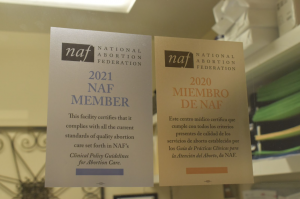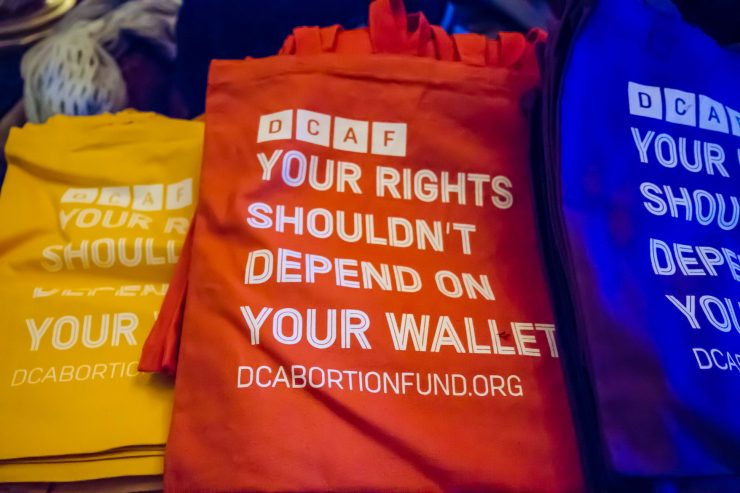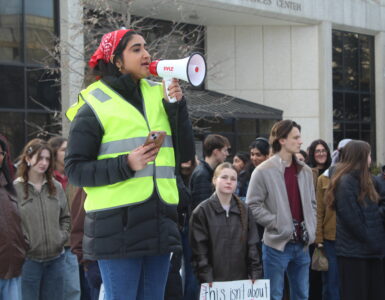Local abortion funds in the District of Columbia and Maryland are navigating an increase in demand and new client needs following the U.S. Supreme Court’s overturning of federal abortion protections.
“We make hard decisions every day about who we’re able to fund,” said Lynn McCann, director of development and communications for Baltimore Abortion Fund.
BAF gives financial assistance to Maryland residents and people traveling to Maryland for an abortion.
The fund expects to receive about 3,000 calls for support this year, McCann said. It will be able to assist approximately half of these prospective clients due to budget restrictions.

An increased need for support has been a trend for years, with BAF seeing a 40% increase in requests each year, said Communications Manager Priya Hay-Chatterjee.
However, the Supreme Court’s ruling this summer has led to an uptick in out-of-state clients traveling to Maryland for an abortion. BAF expects a 60% to 100% increase in call volume over the coming years, Hay-Chatterjee said.
“We really are bracing for an influx, especially as some other states’ abortion laws are still in limbo in their court systems,” Hay-Chatterjee said.
The D.C. Abortion Fund is expecting a similar increase in overall demand, said Communications Director Devin Simpson. The fund serves residents of the District, Maryland and Virginia, as well as people traveling to those areas for a procedure.
DCAF has already seen an influx in out-of-state clients after the Dobbs v. Jackson Women’s Health Organization decision, Simpson said. This affected the amount of resources available to DCAF and local clinics.
“That makes it harder on everyone to get the procedures when they need them,” Simpson said.
The longer people have to wait for an abortion, the more expensive the procedure becomes, Simpson said. This increases barriers to abortions even in areas where it is legal.
Changing costs
Abortion funds across the country are facing this increase in demand, said Gretchen Ely, a professor at the University of Tennessee, Knoxville, who researches abortion funds.
While funds had to make difficult decisions due to limited budgets even before the Supreme Court’s decision, Ely said an increase in out-of-state travel had changed the types of costs patients face.
“Demands have shifted as well to a need now for travel and support around travel,” Ely said.
The average abortion cost for BAF’s clients is $4,000, McCann said. This does not include secondary costs from getting the procedure, like travel accommodations or childcare.

McCann said BAF anticipates spending around $600,000 this year to support abortion care costs. It will disperse another $80,000 in practical support for things like transportation, lodging or translation assistance.
“The need for financial and logistical support for abortion care, even in Maryland specifically, really far exceeds our current budget and our ability to meet it,” McCann said.
The total reported cost of care for BAF’s callers this year is over $5 million, McCann said.
“Even though we wouldn’t be expected or even have the ability to fully fund the entire procedure cost for every single caller, it just really speaks to the total need that’s out there,” McCann said.
Over the past year, DCAF pledged over $1.3 million to almost 6,000 clients — double what it pledged the prior year — according to its website.
Because D.C. is home to multiple clinics that perform abortions later into pregnancies, Simpson said some of DCAF’s clients face bills totaling thousands of dollars. However, the average grant from the fund is $250.
Costs go beyond the actual procedure, Simpson said. Patients may have to take off work, find childcare if they already have kids or arrange transportation to the clinic even if they are residents.
“Whether or not you can afford the ticket price of the procedure, affording all the other things that come along with getting it can be an obstacle for patients as well,” Simpson said.
Simpson said DCAF is a larger fund and has always been able to cover the needs of its callers. However, as more states pass abortion restrictions and their residents have to travel to areas like D.C. for the procedure, Simpson said, “it will be harder.”
“We hope we’re able to continue to fund every single caller and the need they have,” Simpson said.
Essential to patients
Access to BAF has enabled some Potomac Family Planning Center patients to receive the care they otherwise would not be able to afford, said Clinic Coordinator Allison Claytor.
Located in Rockville, Maryland, at least 25% of the clinic’s patients receive funding from BAF, Claytor said.

“The Baltimore Abortion Fund has done a tremendous job about fundraising and helping out our patients,” Claytor said. “They help out our patients quite a bit.”
Procedures at Potomac Family Planning range from $420 to $1,300 depending on where a patient is in their pregnancy, Claytor said. The clinic sees patients from five to 17 weeks of gestation.
Claytor said the biggest obstacles the clinic’s patients face are funding the procedure and securing transportation. BAF can help pay for both of these costs, offering logistical support and healthcare coverage.
“When [patients] get funding, they definitely need it,” Claytor said.
Ely said the primary demographic served by abortion funds is people in low socioeconomic positions. Ely’s research has found that women of color access abortion care at higher rates, likely because they also often fall into lower income levels.
“[Abortion funds] are critical for folks who are lower income in terms of their ability to access abortion care,” Ely said. “They were critical before the Dobbs decision and they’re probably even more critical now.”















Add comment